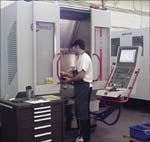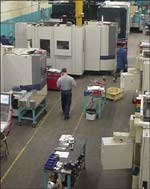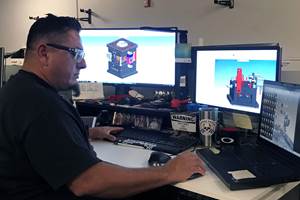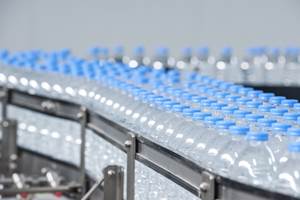Ryka Molds: Project Mgmt and Performance Flow Get Results
This moldmaker bottles up a successful formula of an engineering-driven approach coupled with value-added services with a niche focus on blow molds.
Ryka Molds, Inc.'s (Toronto, ON) customers have been blown away for more than 35 years with the company's specialized niche in producing blow molds in packaging, industrial and automotive applications. For the company, zeroing in on a specific mold has resulted in steady growth and anticipated expansion in the years to come.
Currently 58 employees keep the 48,000-square foot facility running smoothly. According to Ryka Molds President Rick Hanke, a major contributor to the company's success over the years has been its project manager approach combined with what Hanke calls performance flow. "One individual is responsible and accountable for our customers' mold development from concept to operation," Hanke explains. "In many projects, we get involved in the early stages of part design—which means we put a lot of emphasis on confidentiality. This upfront knowledge of the specific mold production objectives and requirements carries on throughout the many stages along the way, resulting in a final operating mold that meets all performance criteria. We call this process performance flow."
This approach has garnered a lot of repeat customers over the last 35 years that have remained loyal to Ryka since the beginning. Hanke points out a majority of its customers are Fortune 500 with worldwide manufacturing facilities mostly in the NAFTA region: the United States, Canada, Mexico and Europe.
A Good Start
Michael Ryan founded Ryka Blow Molds Ltd. in 1970. Ryan's background started in the glass industry, and he then realized quickly the great potential in plastic applications, and thus decided to focus on stretch blow molds. He grew the company over the years into a key supplier of blow molds.
Ryan worked hard to make Ryka Blow Molds Ltd. a major supplier of stretch blow molds. Today the company has customers all over the world. In 2003, he decided to sell the company to SIG of Switzerland. At that time, SIG hired Rick Hanke as managing director to run the company. "I served a moldmaking apprenticeship in Germany, where I'm originally from," Hanke recalls. "I then worked in Canada for several companies in the mold and machine tool industries after I obtained my degree in mechanical engineering.
In November 2004, SIG decided to divest Ryka again, so the company's VP and chief financial officer (CFO), Alfie Stein, and Hanke decided to buy Ryka from SIG and change the company name to Ryka Molds, Inc. Hanke was named president, and Alfie Stein is vice president and CFO. Ryka decided the company would continue to supply blow molds to the markets it already served while continuing to expand its technical capabilities to ensure timely deliveries at competitive prices to its customers.
Meeting Customers' Needs
These days, it pays for a moldmaking shop to offer its customers value-added services instead of simply building molds, and Ryka Molds is no exception. The company has R&D and testing facilities to test all of its molds before they leave the shop floor. "We are an engineering-driven company," Hanke emphasizes. "Other shops can cut metal, but in today's environment, what it really comes down to is engineering know-how, price and delivery. Our customers expect complete solutions, and that is what we provide to them. Our testing facility allows us to learn processing characteristics of the final products, which in turn, we can incorporate into the design of the various types of stretch blow molds. On a smaller scale, we are learning about what our customers go through when they run the mold in a production environment. This is very important.
"We offer sound mold technology, which produces quality molds customers have continued to come to expect from Ryka," Hanke continues. "When a mold leaves Ryka, it will work, and the customer can start production immediately. Again, because of what we have to offer to our customers in the way of cutting costs in their own operations, they rely more and more on us as a supplier—providing value and adding input upfront into the product design, etc.—and they keep coming back."
Ryka Molds has had to keep current with technology to continually evolve and meet its customers' needs. Hanke points out that key personnel in engineering and mold manufacturing attend trade shows and conferences to see new products and technologies. "We actively participate in these areas and spend the money," he notes. "We have a major investment program going on this year. We've had some catching up to do. Now, we are ensuring we have the latest design software, equipment, high-speed machining technology, etc., as part of our three-year Business Plan. We are planning to continually upgrade our equipment, our testing facilities, engineering, manufacturing, etc. So far, we are right on track."
Continuous Education
Of course, having the latest equipment and technology on the shop floor isn't worth that much without highly trained employees to keep it running. Ryka believes in training its employees by working closely with colleges and suppliers. "We currently have a continuous training program underway for all of our team leaders who make the day-to-day decisions," Hanke notes. "In my view, training is just as important as investing in new equipment—it goes hand in hand."
The company's apprenticeship program closely mirrors European programs. Hanke explains, "It is a four-year program where future moldmakers spend a significant amount of time in each department." Ryka has two or three colleges that they work with, most notably, Humber Institute of Technology and Advanced Learning in Toronto. Humber has a specific moldmaking program that has worked quite well for Ryka in fostering and developing new talent. While Ryka actively promotes from within, they also understand the importance of recruiting people from the outside to bring new ideas into the organization.
The company has a number of long-term employees (20-plus years), which Hanke attributes to the fact that Ryka treats its employees with respect by getting them involved, keeping things interesting and offering them a "well-equipped, safe" workplace. "We compensate competitively—they have no reason to leave. We welcome their input and encourage them to ask questions as we are always looking for ways to improve our processes and build our molds better."
Expansion Underway
Recent ISO 9001-2000 Standard certification has helped Ryka Molds become more structured and develop better business processes, which is taking the company to the next level. Hanke states, "We are looking to grow the business while keeping our current customers satisfied. Down the road, we want to expand our product portfolio. Recently, we hired a dedicated salesperson to generate new business."
Hanke adds that thus far, overseas competition hasn't affected Ryka's bottom line, but acknowledges the potential is there in the near future. Ryka plans to counteract this by continuing to focus on its company's niche and apply latest design and manufacturing technology and provide top-notch customer service. "Over the years, we have constantly been in tune with the challenges that our customers are facing, have always provided them with solutions and kept abreast of the new technologies. This has always been our greatest contribution to the industry."
Related Content
Mold Design Review: The Complete Checklist
Gerardo (Jerry) Miranda III, former global tooling manager for Oakley sunglasses, reshares his complete mold design checklist, an essential part of the product time and cost-to-market process.
Read MoreMaking Mentoring Work | MMT Chat Part 2
Three of the TK Mold and Engineering team in Romeo, Michigan join me for Part 2 of this MMT Chat on mentorship by sharing how the AMBA’s Meet a Mentor Program works, lessons learned (and applied) and the way your shop can join this effort.
Read MoreWhat is Driving Mold Lifecycle Management Digitalization?
OEMs are looking to partner with suppliers to share and track data across the supply chain for advanced intervention and process management.
Read MoreThe Critical Role of Management Representatives in ISO 9001
In ISO 9001 quality management systems, the Management Representative (MR) plays a crucial role. While the 2015 version of ISO 9001 no longer mandates this position, having a trusted management member serve as an MR remains vital for streamlining operations and maintaining quality standards.
Read MoreRead Next
Are You a Moldmaker Considering 3D Printing? Consider the 3D Printing Workshop at NPE2024
Presentations will cover 3D printing for mold tooling, material innovation, product development, bridge production and full-scale, high-volume additive manufacturing.
Read MoreReasons to Use Fiber Lasers for Mold Cleaning
Fiber lasers offer a simplicity, speed, control and portability, minimizing mold cleaning risks.
Read More





















